US official: Russian airliner was not shot down in Egypt
Investigation continues into cause of crash
The Pentagon is certain the Russian airliner that exploded over the Sinai Peninsula Saturday was not shot down, a U.S. defense official with access to the latest intelligence report of the crash told Fox News.
“There is no way it was brought down by a missile or anti-aircraft fire,” the official said.
The crash killed all 224 people on board. The official confirmed that an explosion took place, which was picked up by U.S. intelligence satellites which detect heat signatures and explosions around the world.
Even though the Pentagon does not think Russian flight KGL9268 was shot down, the U.S. intelligence community cannot rule out terrorism.
"It's unlikely, but I wouldn't rule it out," said James Clapper, the director of national intelligence in Washington Monday when asked about a possible tie to terrorism.
On Monday, a top official for the Russian airline Metrojet said the Airbus 321 did not crash due to mechanical or pilot error.
Meanwhile, the U.S. Embassy in Egypt instructed its staff members Tuesday not to travel anywhere in the Sinai Peninsula following the crash.
In a statement, the Embassy said the travel ban was in place as a precautionary measure pending the outcome of the investigation into the crash.
The plane was en route from Sharm el-Sheikh to St. Petersburg when it went down over the northern Sinai Peninsula approximately 23 minutes after takeoff. The overwhelming majority of the passengers were Russian holidaymakers flying home.
Russian officials said the first 10 bodies of victims were identified by their families Tuesday.
Alexei Smirnov of the Russian emergency situations ministry said that a total of 140 bodies and more than 100 body parts were delivered to St. Petersburg on two government planes on Monday and Tuesday and that a third plane is expected to bring more remains later on Tuesday.
Egyptian President Abdel-Fattah el-Sissi said Tuesday that the security situation in the Sinai Peninsula is under "full control" and that claims by the Islamic State group that it downed the plane were "propaganda" aimed at damaging the country's image.
In an interview with the BBC released Tuesday, el-Sissi also reiterated his assertion that the cause of the crash may not be known for months and that until then, the causes should not be speculated on.
Islamic State militants said on the day of the crash that they had "brought down" the Russian plane to avenge those killed as a result of Moscow's recent air campaign in Syria, launched in support of ISIS adversary President Bashar Assad.
But the group did not provide any evidence to back up its claim, and militants in northern Sinai have not to date shot down commercial airliners or fighter jets.
Fox News’ Lucas Tomlinson and The Associated Press contributed to this report.









































